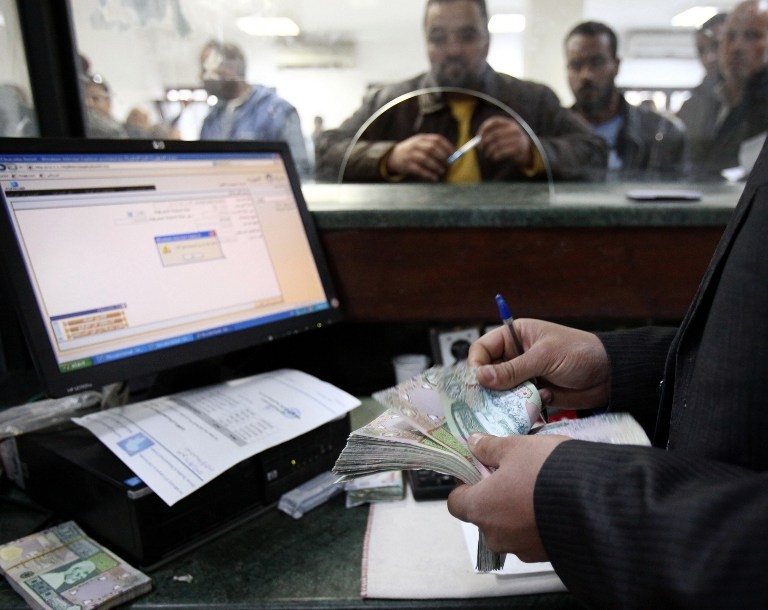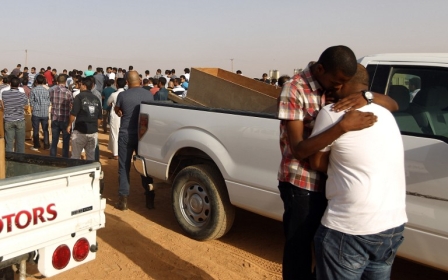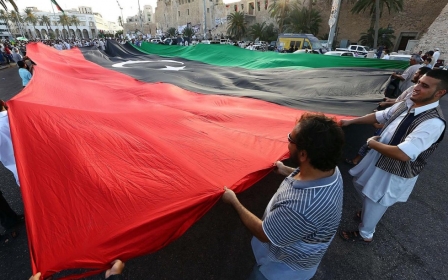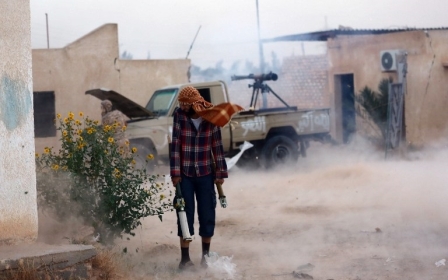The battle over Libya's oil revenues and the rise of the central bank

While the battle for control of Libya's oil ports has been seen as a critical indicator of victory in the civil war, the money received from oil sales currently has one sole destination: the Central Bank of Libya.
Oil accounts for 95 percent of state revenue in Libya and 65 percent of the country's Gross Domestic Product (GDP). The country has the largest oil reserves in Africa and the fifth largest in the world, with oil terminals scattered across the country but mainly concentrated in the northeast. With the Tripoli-based bank's full control of these vital oil revenues, it has become a key, if not the supreme player in the ongoing civil war, according to well-placed sources and analysts.
And it's not the oil revenues alone that the bank holds. The CBL controls the country's entire purse strings at the moment, including $100bn in foreign currency reserves. It is from the bank’s headquarters that money is distributed and assets accessed across Libya. This includes money that the Tobruk-based House of Representatives (HoR) needs to spend and function as an effective political force.
In recent weeks, the HoR has attempted to reclaim control over the bank by dismissing its governor Saddek Omar Elkaber.
He has refused to accept the decision and on 23 September announced a legal challenge against his sacking in a letter to the HoR. In the letter, he said they can only remove the CBL governor in “exceptional circumstances”, none of which, he said, had been met in his case.
“I do believe that the action undertaken by the HoR erodes the independence of the institution and is potentially harmful to its stakeholders,” he said in the letter. “A weak central bank or one which is vulnerable to political influence is a risky proposition.”
Elkaber indicated he will stand down in the interim, as he faces a courtroom battle with the HoR, but said the CBL will “continue to fulfil its responsibilities to the highest degree of professionalism and transparency” in his anticipated absence.
It is not clear if his deputy, Ali al-Habri, appointed as the new governor by Tobruk, will serve as his temporary replacement. Al-Habri supports the HoR, as opposed to the reconvened General National Congress (GNC) in Tripoli, where a coalition of Islamist-Misratan militias have seized the city from forces loyal to the Tobruk-based parliament.
Meanwhile, in the capital, an oil minister for the GNC-appointed government has announced a takeover of the Ministry of Oil. Mashallah al-Zwai said on 22 September he would oversee a transfer of power from the previous oil minister Omar al-Shakmak, according to Libya Herald.
Oil highs and lows
Libya’s oil sector has seen a recent spike in production, after a near yearlong blockade was lifted in July by Ibrahim Jadran and his rebels in a goodwill gesture to the HoR. As part of the lifting, Jadran and his forces reopened the largest and third largest ports of Es Sider and Ras Lanuf.
Production has been hit by the civil war though. On 21 September, daily production fell from 870,000 barrels to 750,000 barrels due to the closure of the Sharara oilfield in the country’s south west when heavy fighting broke out in the nearby town of Zawia.
In Tripoli, mysterious airstrikes have continued to hit the Misratan Led Alliance (MLA), as forces loyal to the government in Tobruk battle to reclaim control of the capital. It is not known who is operating the mystery jets, although it emerged last month that the UAE and Egypt appeared to be behind bombing raids against the MLA in Tripoli.
The HoR is likely desperate to take back the capital, as the CBL is currently able to tightly control their ability to spend, which is in no small part down to the accounting of oil revenues by the central bank. “I have received confirmation oil revenues are first transferred to the National Oil Corporation (NOC) them onto the Tripoli branch of the central bank,” said Mattia Toaldo, a visiting fellow at the European Council on Foreign Relations (ECFR).
“If the oil money is deposited in the central bank, specifically in the Tripoli branch, regardless of who the governor is I would say those who control the capital and the central bank are in charge of the oil revenues,” Toaldo said.
A highly placed source in Libya told MEE that the CBL will not allow the HoR to freely spend beyond “the essentials”.
“The 2014 budget was passed by the GNC with the understanding that if oil revenues fall below the projected exports figures, the CBL will cover the deficit but only up to the level of paying essentials – salaries, benefits, fuel and food subsidies,” the source said, requesting anonymity due to the sensitive political environment.
“Since oil revenues are, in fact, significantly below the projections made eight months ago, notwithstanding the recent uptick in production, the CBL continues to only cover those items and not cover deficit spending on capital projects and investments.”
“This understanding and policy precedes the election of the HoR and will not be affected by their recent decision to dismiss Elkaber,” the source said.
The HoR has certainly grown angry with the CBL and its refusal to allow the Tobruk-based parliament free reign on spending. The decision to dismiss Elkaber was reportedly made after he blocked the transfer of $65mn from the CBL to the HoR, which he is believed to have done because the HoR failed to fulfil procedural requirements for the transaction.
CBL difficult to relocate to eastern Libya
The battle for control of the CBL has raised the question of whether the HoR will seek to establish a new central branch of the bank in its eastern stronghold. With a new branch, oil revenues could be redirected to a commercial bank in Tobruk or al-Bayda, although MEE’s Libyan source said this would be extremely problematic.
“Relocating the CBL to the east is easier said than done since most electronic and clearing systems are housed in Tripoli, not to mention the trained personnel who manage those systems and keep the CBL running,” the source said. “The HoR and the elected government will have access to funds but no capacity or knowledge to disperse money since all the systems that keep track of salaries, for example, are based in Tripoli.”
“In other words, access to funds does not solve the problem that the HoR and elected government has in managing the finances of the country and discharging their responsibilities by being based outside of Tripoli, at least in the short-term.”
The source said that if the CBL is denied access to oil revenues “it is not clear how it will continue to disperse salaries through Tripoli without quickly depleting its reserves.” The IMF has warned that a reliance on the bank’s reserves would lead to them being emptied within five years.
The CBL has not been the only body putting a squeeze on HoR spending. Libya’s Audit Bureau announced last week that transactions from the CBL to ministries and public companies would come under new restrictions. The CBL is now only authorised to pay for public sector salaries and expenses below 200,000 Libyan dinars ($163,750).
“The new regulations are in response to a crisis over the CBL’s assets, with the rival assemblies – the HoR and revived GNC – vying for control,” reported Libya Monitor.
The Audit Bureau is an independent body based in Tripoli that is answerable to the “legislative branch”, according to MEE’s Libyan source, who said their decision pointed to increased restrictions on the HoR.
“The Audit Bureau has the power to block any project expenditures by government entities,” they said. “If the coordinate with the CBL, as they appear to be, they could create another layer of resistance to government expenditure, as spending has to clear the CBL accounts and seek approval by the bureau.”
Oil blockade, asset freeze on the horizon?
The HoR has few cards to play in combatting restrictions on their power which may, in some part, explain the renewed air strikes on MLA targets in Tripoli. One potential strategy, however, could be the imposition of a renewed oil blockade, which would stifle the CBL of access to hydrocarbon receipts. This, however, does not appear to be on the table according to both the Libyan source and Toaldo of the ECFR.
“A blockade weakens the government’s position and, by extension, its ability to cover expenditures as well as equally impacting on the CBL’s ability to continue covering the deficit,” the source said.
Toaldo said a precarious political balancing act is taking place in which both sides want the system to keep going despite conflict over control of the country’s money.
“There is a shared interest in keeping the system flowing so I don’t think those in control of the oil ports have an interest, at the moment, in enforcing a new blockade,” he said. “Also, those in control of the central bank [in Tripoli] do not have an interest in pressuring the system too much and denying Tobruk too much money – there is the threat of the HoR trying to relocate the CBL to the east as well as the spectre of an international freeze on CBL assets in Tripoli.”
“I don’t think it’s in the interest of anyone to break the system down.”
The Libyan source said the HoR is unlikely to seek out an international asset freeze as “they would also lose” in that situation. “Everyone’s goal is having access to the assets as opposed to losing them.”
The International Crisis Group’s Claudia Gazzani has previously told MEE that the international community could use an asset freeze to “force dialogue” on both sides of the political divide.
An asset freeze could be reasoned using a UN Security Council resolution passed in March that prohibited “attempts to illicitly export crude oil from Libya” and underlined “the primary responsibility of the Libyan authorities in taking appropriate action” in stopping trade by non-state actors.
The HoR is generally recognised by international actors as being Libya’s legitimate and sole political authority. The UN has moved to encourage dialogue aimed at reconciliation, although it remains to be seen how effective this will be. A recent conference in Madrid was criticised for failing to include representatives from the GNC.
New MEE newsletter: Jerusalem Dispatch
Sign up to get the latest insights and analysis on Israel-Palestine, alongside Turkey Unpacked and other MEE newsletters
Middle East Eye delivers independent and unrivalled coverage and analysis of the Middle East, North Africa and beyond. To learn more about republishing this content and the associated fees, please fill out this form. More about MEE can be found here.




